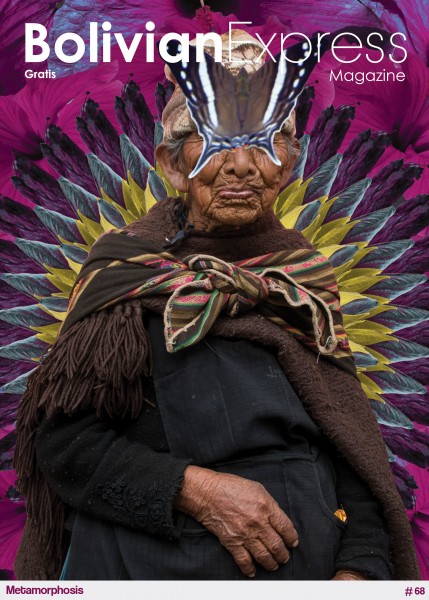
What started with a failed constitutional referendum to allow President Evo Morales to run for an additional term in 2020 and closed with an ongoing nationwide water crisis gripping rural and urban areas nearly equally, 2016 has been a very interesting, and some would say critical, year for Bolivia. And as the year comes to a close, we all are taking the opportunity to take it all in, and to wonder what it all has meant and what the future may hold. This year, if anything, has taught us that sometimes changes signify growth or improvement, and sometimes they signify deterioration or regression. But in either case, the process is both exciting and challenging.
We have accomplished a lot at Bolivian Express over the past year. We trained 40 journalists from seven countries in the past 12 months, and have opened more doors to collaborate with incredible writers and artists from all over Bolivia to help us share this amazing country with our readers. We launched our first book, Bolivia Out of Sight: Postcards from the Unreported, and are currently hosting a related photo exhibit at Ciclik, a café/restaurant in La Paz’s Sopocachi district. We’ve maintained relationships and created new partnerships with businesses and organizations all over the country, all vibrant collaborators who play an important role in making this publication what it is. So we want to take the opportunity to say ‘Thank You!’ to all our writers, designers, collaborators, advertisers, partners, and readers for everything you have done with and for us in 2016. We would not be here without you!
For many, a new year marks a time of change, of promised improvement. And we at this publication see this time of year the same way. This issue of Bolivian Express is our final issue for 2016, with our next publication hitting the streets in mid-February 2017. By that time, you will see many changes to the magazine. The team is currently working on reimagining who we are, what we are about, and what we have to offer. Today, some details are uncertain, but we will be excited to unveil a renewed organization, an invigorated publication, and an expansion of the larger Bolivian Express network that will allow for new ways to engage with the community around us.
In 2017, we will be different. We will be bigger. We will be better.
In the spirit of the impending renewal that comes at the end of every year, and in honour of changes coming ahead for this publication, this issue of Bolivian Express focuses on this idea of ‘metamorphosis’, of drastic and lasting change. This month, our contributors explore changes in society in the face of global challenges: how Bolivia’s water crisis is changing the way its urban inhabitants are adjusting to a new reality of rationing and uncertainty; how Latin America’s push for energy development is affecting communities in the Amazon located at the sites of large hydroelectric projects; how the significance and value of natural spaces reach new levels of importance as new species are identified and catalogued. We learn about the constant reimagining of icons, from generational perspectives on the significance of Che Guevara to modern artistic interpretations of Bolivia’s cholitas through new tattoo styles. And on more personal levels, we explore the redemption of young people who have turned away from a life of delinquency to create a better world for themselves and others, and a man who has taken on a superhero-like alter ego to use satire and sarcasm to ignite political discussions on social media.
These are just a few examples of change that you will find in the pages of this issue. And the variety of topics we address here clearly show that metamorphoses can happen in variety of ways, from how someone sees themselves in the world to the restructuring of national and international power structures. Hopefully the process brings positive change, like a classic image of a caterpillar emerging from its chrysalis as a beautiful butterfly.
So at the end of 2016 and the dawn of a new year, join us with this issue of Bolivian Express as we celebrate the joy and complexities of the process of perpetual rebirth.
A Detention Centre for Adolescents Tries the Restorative-Justice Route
I am sitting in Café Urbano in Sopocachi listening to ‘El Fénix’, a song by paceño rapper-songwriter Fercho. The lyrics, set to hip-hop beats with Latin flavour, tell a story of redemption – Fercho’s own.
‘I'm gonna get out of this hole that I stuck myself into,’ Fercho raps in Spanish. ‘I'll live again / like a phoenix, I'll be reborn / Run like the times, fly with the wind / Free and unimpeded.’
Fercho, the stage name of Luis Fernando Gutiérrez Eyzaguirre, is short and athletic with light brown skin and a shy smile. He was orphaned at 12 years old and subsequently got involved with petty crime, including robbery. In 2012, when he was 20, he was convicted of aggravated assault. As an adult, he could have been sent to the San Pedro prison in central La Paz, but instead he was sent to Qalauma, the first juvenile social-rehabilitation centre of its kind in Bolivia. He served a 20 month sentence and was then released on probation for good behaviour.
Since opening in 2012, Qalauma, which is located about 20 kilometres south of La Paz on the altiplano, has housed approximately 600 teenagers and adolescents between the ages of 15 and 25. The centre’s approach to social rehabilitation is based on the idea of ‘restorative justice’, which takes a more human and holistic approach in working with inmates than other detention centres. Qalauma tries to change the punitive essence of the penitentiary system towards a more humane treatment of the incarcerated.
Qalauma is an Aymara word meaning ‘the drop of water that carves the stone’. The name itself is full of symbolism and serves as a metaphor for both the judicial and penitentiary systems and attempts towards the reform of these systems. The ‘stone’ symbolises the hard and rigid nature of the judicial system and its punitive approach. It also represents the existing prejudice towards inmates in Bolivia. The ‘drop of water’ symbolises the notion that change can happen through perseverance and conviction.
In more traditional penitentiary systems, the aim is to punish offenders with no reconciliation for the victim or community. However, the restorative-justice approach at Qalauma turns the idea around by focusing on the needs of both the victim and the offender, as well as involving the community. The center’s restorative justice process involves three stages of rehabilitation. First, a personalized diagnosis of each offender is created to identify what factors and conditions led him to commit a crime and an individualized strategy is identified to help mitigate past traumas. Second, education and training is provided to the offenders, in the form of professional workshops. Third, the center offers therapy sessions in which family members and victims can confront the offender.
‘I'll live again / like a phoenix, I'll be reborn.’
- from ‘El Fénix’, by Fercho
Around half of the inmates in Qalauma had dropped out of school before being incarcerated, so the training and workshops are particularly valuable to the young offenders. For Fercho, the education and musical workshops he received at the centre provided the opportunity to record an album called La Misión. Because of prejudice that society has towards inmates, he’s had difficulty finding work. ‘I couldn't find a steady job and I was often overworked and underpaid,’ Fernando says. ‘It's a stigma you carry.’ He currently works part-time, selling mail-order items – clothes, perfumes, jewellery – door to door.
Despite obvious challenges, the experiences of the inmates at Qalauma have had significant positive effects. Since it opened less than five years ago, the rate of all all former inmates that have relapsed back into criminal activity remains less than 7 percent. Qalauma's successful model has paved the way for reform of the juvenile judicial and penitentiary systems. It now serves as an example that is being copied throughout Bolivia.
Although he doesn't recall his time locked up as a pleasant experience, Fercho is thankful for the help he received there. ‘If it weren't for Qalauma, I don't know where I'd be right now,’ he admits. ‘It helped me realize that I'd need a change in life.’

 Download
Download





















